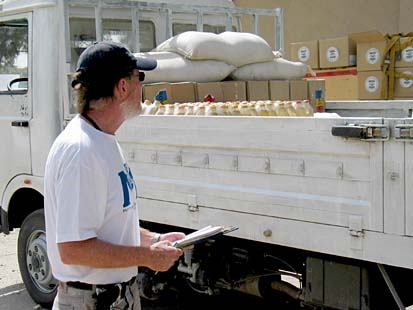
COURTESY PHOTO
Dr. Jeffrey Goodman of Kauai headed one of four volunteer teams of medical personnel that went to Iraq in April.
Kauai doctor helps bring
medical care to Iraq
LIHUE >> The war in Iraq has left that country's medical system in shambles, a Kauai doctor serving as a volunteer there said.
The hospitals are in terrible condition because of looting by the Iraqis themselves, said Dr. Jeffrey Goodman.
"Just looking around me, it's difficult to find any war damage, but there is looting damage everywhere," said Goodman in a telephone interview from Baghdad last week.
"It's a mess here, I'll tell you, it's a mess."
Looters demolished the country's central blood bank, he said, and damaged virtually every medical facility. "We have dialysis machines we can't use because someone stole all the switches and dials from them," he said.
Goodman left Kauai April 10 to head one of four volunteer teams of medical personnel sent to Iraq by the International Medical Corps. He is scheduled to leave Iraq this week.
Goodman, 58, has been a family practice physician on Kauai's north shore since 1972.
In recent years, he has twice volunteered to work with the nonprofit International Medical Corps in Afghanistan. When the U.S.-led coalition announced early in April it would allow humanitarian groups into Iraq, Goodman immediately called the organization's headquarters in Los Angeles and volunteered.
"We expected to be held back in Kuwait City for a long time after we arrived, but we were only there one day and then were allowed into Nasiriyah," Goodman said. After six weeks in Nasiriyah, Goodman was sent to Baghdad.
"I felt we did good work in Nasiriyah. Nasiriyah was a hell hole. It hit 115 degrees every day and the dust was horrible, and we slept in tents and lived on peanut butter and MREs (Meals Ready to Eat). But I think we did a lot of good."
In particular, Goodman was deeply touched by a large number of children with leukemia in Nasiriyah who were not receiving adequate care. He said Iraqi doctors have told him the incidence of blood-related cancer among Iraqi children has tripled in the decade since the first Gulf War.
Goodman has helped many of the children with cancer to relocate to Jordan, where facilities to treat them are available.
In Baghdad, he has a generator and air conditioning in his room, but the medical situation is even worse than in Nasiriyah, he said.
"In Baghdad, we have a huge problem getting medical supplies to where they're needed because there is nothing left of the medical transportation system. I have a whole warehouse full of drugs that can't be distributed," Goodman said. "In the last week before I leave I'm going to try to distribute 90 tons of badly needed supplies."
"The U.S. military is the government here. They run everything. But they weren't able to take care of the health sector. To their credit, at least they admitted they couldn't do it and allowed as many as 60 to 80 organizations to come in and help," Goodman said.
"We have Koreans, we have Belgians, you name it and they're here. Some groups, like the IMC, specialize in health care; others are experts in sanitation. Virtually everything needs work."
Goodman said the situation in Iraq is very different from what he found in Afghanistan.
"In Afghanistan, we had to start from scratch. In Iraq, all of the system was in place before the conflict -- it may not have been functioning very well, but it existed -- so we haven't tried to re-invent the wheel," he said.
"It's a matter of giving it a kick start to get it going again," he added.
Goodman says nongovernment organizations or NGOs like his are dividing tasks among themselves to provide health care. Although they coordinate with the military and Goodman said he has met "many terrific American soldiers," the NGO workers are not seen in public with the soldiers.
"We don't like riding around with them (U.S. soldiers). We travel in our own unmarked vehicles. It's much safer that way," Goodman said.
Now the problem is the Iraqis are becoming too dependent on the NGOs and there does not appear to be a plan to replace them. A succession of Iraqi health ministers appointed by the U.S. military government has resigned, Goodman said.
"It's hard for us to tell what the military is thinking. It's all very vague. The U.N. has only been here a couple of weeks, and it isn't clear what their role will be," Goodman said.
"I'm confident the U.S. government will eventually pour enough money on all of this to get it sorted out, but it's hard to say when that will occur," Goodman said. "The whole effort to restore Iraq's medical system is really just in its infancy."
Goodman is flying to Idaho this week for a family reunion and what he hopes will be lots of fishing before returning to Kauai in mid-July. He said he was glad he was able to help but just as glad that he's leaving.
"I'll be happy to get out of here," he said. "After a while it just wears you down. It gets old."
